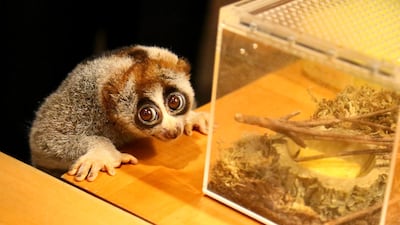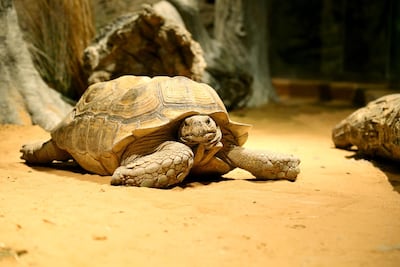An indoor rain forest attraction in Dubai is being inundated with requests to take in abandoned exotic animals.
Green Planet began receiving phone calls from the public after it adopted a slow loris earlier this year.
The nocturnal primate, called Lonely, was abandoned in a box near a veterinary clinic in Dubai in January.
Staff contacted the centre, which took him in and months later another slow loris - Amal - was found abandoned on the street. The pair now live together at the enclosure.
In the latest case, the centre took in a huge tortoise found dodging traffic in a Dubai suburb.
“We are finding a lot more animals because of our story about the slow loris,” said Victoria Lynn, general manager of Family Entertainment Centres, which runs Green Planet.
“Since that we have received a number of phone calls every week alerting us to animals.
“We have a team of trained people but we also don’t have the skillset to look after each and every animal that we get calls about.”
“In this particular case with the tortoise it was deemed okay for us to keep him, so we were quite happy with that.
Pet abandonment is a major issue across the UAE, and one which the government has sought to address through legislation.
It was made a criminal offence to abandon a pet last year and in 2016 a federal ban on the private ownership of exotic animals was introduced.
But the problem persists and prosecutions are thought to be rare.
The downgrading of 28 offences including some types of animal abuse in October also caused confusion.
“It is a huge problem,” said Dr Mehdi Mzabi, partner at Barsha Veterinary Clinic in Dubai.
“It’s really correlated to the holiday season, which is where we see a lot of dumped animals. It’s mainly summer but also at Christmas as well.”
Sarita Harding, a Briton who volunteers for Animal Action UAE, said pet abandonment was particularly rife in the Emirates because of the country’s transient workforce.
“Unfortunately not everyone plans to take their pets with them,” she said.
“And sadly it’s not always the easiest of processes.
“There can actually be restrictions. In some countries they [the pets] have to go into quarantine, which adds to the cost.”
She urged anyone taking on a pet in the UAE to save for the day they leave, so they have the funds to take the animal with them.
“We are in a country where we all know it’s temporary, therefore plan for it,” said Ms Harding.
“We always say would you leave your child? And a dog or a cat is like a child. They are dependent on you.
“Once they have been domesticated they can’t go back on to the streets. They won’t survive.”
Animal Action UAE mainly deals with abandoned cats and dogs, but it also looks after parrots, lovebirds, rabbits and tortoises.
“One of our rescuers has ended up with a tortoise that had been abandoned,” said Ms Harding.
“She was saying recently that she didn’t know what she would do because they are not easy to take back to the UK.
“If you’re not sure, get advice before you adopt from a rescue charity or a relocation company.”



